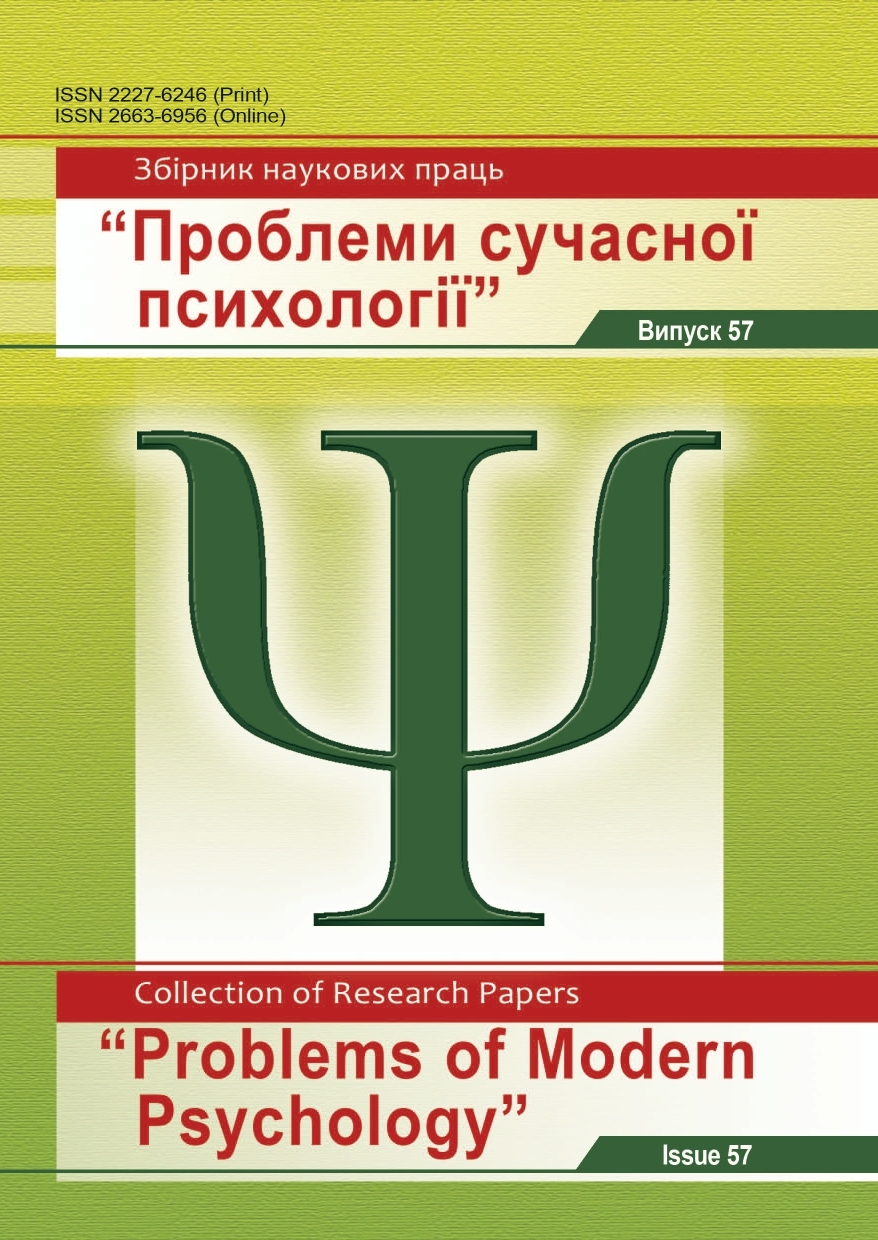The Theory of Lateral Thinking and the Development of Informational Scripts
DOI:
https://doi.org/10.32626/2227-6246.2022-57.90-108Keywords:
Creative Psychology, the theory of lateral thinking, vertical thinking, informational scripts, methods of creative transformation, unmotivated regrouping of elements, gaining of information, expansion of the information fieldAbstract
The aim of our research is to study dominant areas of theoretical and empirical researches in the paradigm of Creative Psychology, to describe the theory of lateral thinking and the development of informational scripts within it.
Methods of the research. The following theoretical methods of the research were used to solve the tasks formulated in the article: the categorical method, structural and functional methods, the methods of the analysis, systematization, modeling, generalization.
The results of the research. It is showed that the main ways to change and develop information scripts in the paradigm of the theory of lateral thinking are: free, unmotivated regrouping of elements; gaining of information; expansion of the information field, inclusion of random “extra” information in the already known individual of the frame; an abrupt way of developing a certain idea. The principles of lateral thinking are: postponement of the assessment; the accident; the information which jumps in any direction; doubts; future; the opposite of absolute confidence.
Conclusions. So, distinguishing between vertical and lateral thinking, we emphasize two cardinal, opposite and interrelated areas of the creative process: the association and dissociation of information elements, the creation of stereotypes and their destruction. It is also substantiated the possibility of creating a system of technologies and methods of creative transformation. It is proved that all these were of fundamental importance for the prospects of developing psycho- correctional and developmental programs in the Psychology of Creativity. Some current issues of Creative Psychology (CREATIVE PROCESS – RESULT – PERSONALITY OF THE CREATOR) are identified, the scientific context of personality is determined, the presupposition and dominant guidelines for further search and implementation of our own empirical researches are showed.
References
Ball, G.О. (2017). Ratsiohumanistychna oriientatsiia v metodolohii liudynoznavstva [Rational humanistic orientation in the Methodology of Anthropology]. Kyiv: SKD Publishing House [in Ukrainian].
Honcharuck, Nataliia, & Onufriieva, Liana. (2018). Psykholohichnyi analiz rivniv pobudovy komunikatyvnykh dii [Psychological analysis of levels of communicative actions’ constructing]. Psycholinguistics. Psykholinhvistyka. Psikholingvistika – Psycholinguistics. Psycholinguistics. Psycholinguistics, 24(1), 97–117. Retrieved from https://doi.org/10.31470/2309-1797-2018-24-1-97-117 [in Ukrainian].
de Bono, Edward (2015). Henialno! Instrumenty resheniia kreatyvnykh zadach = Serious Creativity: Using the Power of Lateral Thinking to Create New Ideas [Ingenious! Tools for solving creative problems]. Moskva: Alpina Publisher [in Russian].
Freud, S. (1992). Der Witz and seine Beziehung zum Unbewussten. 2nd ed. Frankfurt: Frankfurt am Main.
Ivashkevych, Ed., & Hudyma, A. (2019). Psychological ways of the development of intercultural competence of pupils in the field of “Foreign Language Education” (according to the experience of education in foreign countries). Zbirnyk naukovykh prats «Problemy suchasnoi psykholohii» – Collection of research papers “Problems of modern psychology”, 49, 84–105. Retrieved from https://doi.org/10.32626/2227-6246.2020-49.84-105.
Maslow, А. (1982). Samoaktualizatsiia. Psikhologiia lichnosti. Teksty – Selfactualization. The Psychology of a Personality. Texts. (pp. 108–116). Moskva: MGU Publishing House [in Russian].
May, R. (1975). The courage to create. (pp. 217–227). New-York.
Mykhalchuk, Nataliia, & Kryshevych, Olga (2019). The peculiarities of the perception and understanding of Sonnets written by W.Shakespeare by the students of the Faculty of Foreign Languages. Psycholinguistics. Psykholinhvistyka. Psikholingvistika – Psycholinguistics. Psycholinguistics. Psycholinguistics. Series: Psychology, 26(1), 265–285. Retrieved from https://doi.org/10.31470/2309-1797-2019-26-1-265-285.
Nabochuk, A. (2021). The developing of the teacher’s creativity by using authentic material at the lessons. Zbirnyk naukovykh prats «Problemy suchasnoi psykholohii» – Collection of research papers “Problems of modern psychology”, 52, 182–203. Retrieved from https://doi.org/10.32626/2227-6246.2021-52.182-203
Onufriieva, L.А. (2017). The Psychology of Professional Realization of a Future Specialist’s Personality: Theoretical and Methodological Aspect. BonusLiber: Rzeszów. ISBN 978-83-65441-83-6.
Pototska, І. (2014). Psykholohichni umovy rozvytku pedahohichnoi obdarovanosti u maibutnikh uchyteliv [Psychological conditions for the development of pedagogical talent of future teachers]. Extended abstract of Candidate’s thesis. Kyiv [in Ukrainian].
Rogers, C. (1993). O gruppovoi psikhoterapii [About group Psychotherapy]. (Transl.). Moskva: Gil-Estel [in Russian].
SAMOAL test (2020). Retrieved from psytests.org/shostrom/samoal-run.html/
Suler, J.R. (1980). Primary process thinking and creativity. Psychological Bulletin, 88, 144–165.
Urban, K.K., & Jellen, H.G. (1989). Assessing creative potential (via drawing production): the test for creative thinking. New-York: Drawing production (TCT-DP).
Downloads
Published
How to Cite
Issue
Section
License
Copyright (c) 2022 Nabochuk Alexander

This work is licensed under a Creative Commons Attribution-NonCommercial 4.0 International License.
Copyright
The Editorial Board has the full right to publish original scientific papers containing results of theoretical and experimental research works which are not currently subject to review for publication in other scientific editions. The Author shall transfer to the editorial board of the Collection the right to spread the electronic version of the paper, as well as the electronic version of the paper translated into English (for papers originally submitted in Ukrainian and Russian) by all kinds of electronic means (placement at the official website of the Collection, electronic databases, repositories etc).
The Author of an article reserves the right to use materials of the paper, without approval with the editorial board and the founders of this Collection: a) partially or fully, for educational purposes; b) for writing own dissertation papers; c) for preparation of abstracts, conference reports and presentations.
The Author of an article can place electronic copies of the paper (including the final electronic version downloaded from the official website of the Collection) at:
- personal web resources of all Authors (websites, webpages, blogs etc.);
- web resources of the institutions where the Authors are employed (including electronic institutional repositories);
- non-profit public access web resources (for example, arXiv.org).
But in all cases, it is obligatory to have a bibliographic reference to the paper, or a hyperlink to its electronic copy placed at the official website of this Collection.






